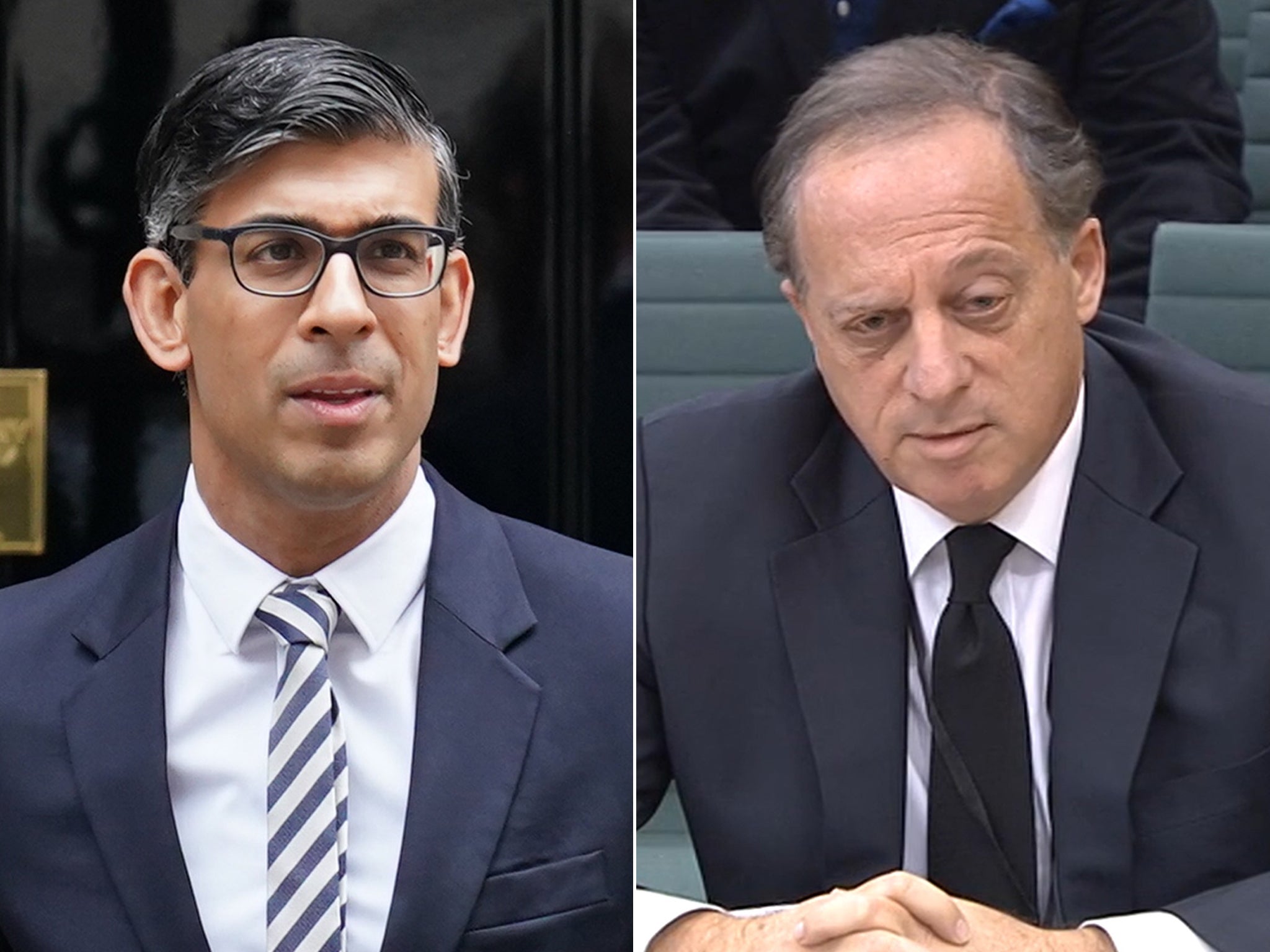Rishi Sunak should have sacked Richard Sharp straight away
Now he needs to tighten up the rules on ministerial interests that allowed Boris Johnson to accept help with his personal finances in secret, writes John Rentoul


The moment Richard Sharp admitted that he had helped Boris Johnson with his personal finances, Rishi Sunak should have sacked him. There was no need to appoint a lawyer to conduct an inquiry, because Sharp, as he now accepts, had broken the rules.
Sharp himself resisted the conclusion, which was that he therefore could not continue as chair of the BBC, until now. I can understand that he needed time to think about it, and that the prime minister is a polite person who believes in due process.
He was polite enough to allow Dominic Raab, his deputy, to pretend that his resignation was his own decision. But that was a case of shades of grey, clarified only by Raab’s unwise commitment in a TV interview that he would resign over anything even off-white.
Sharp’s case was more straightforward. He had done Johnson a favour. Johnson had appointed him chair of the BBC. Sharp hadn’t told the department that oversaw the appointment, or the panel that interviewed him, or the select committee that scrutinised him, about this “potential perceived conflict of interest”, as today’s report puts it. All these facts were known and accepted in January, and Sunak should have acted on them then.
Everything else is delay, a waste of taxpayers’ money and second-order stuff. The fees paid to Adam Heppinstall KC for conducting his independent inquiry are trivial compared with the NHS budget, of course, but they are too high a price to pay for prime ministerial politeness. They are certainly too much to pay for Sunak’s side motive of appeasing the Tory grassroots Boris club, determined to make the former prime minister a martyr.
Because Sharp’s resignation is obviously the right decision, if three months late, the political caravan has already moved on. Lucy Powell, the shadow culture secretary, is pressing for Sharp’s replacement to be appointed independently of government. Labour has already said that if it wins the next election the BBC will be “independent of government”.
It already is, in most senses, but I assume that this means a Labour government would give up the right to appoint the chair and hand it over to an independent body.
I doubt if this would make much difference in practice, and there is a danger that it would turn the BBC into even more of a self-perpetuating establishment bureaucracy than it is now. It could be argued that the BBC has had chairs with known political affiliations before, without undue damage to its reputation for impartiality.
Indeed, its most shameful episode, when it published untruths about the government’s case for the Iraq war, occurred under Gavyn Davies, a Labour supporter, appointed by the Labour government.
Even if the power of appointment is taken away from government, appointments of such political people should still be allowed – as long as everything material is disclosed – otherwise the post will only ever be held by bloodless types who have been careful to hide their opinions all their lives. The point that Sharp’s case illustrates is only that, if his potential conflict of interest had been disclosed, he would not have been appointed.
What is just as important is that it was only by journalism that Sharp’s “inadvertent” failure to declare his interest came to light. We should not allow an obsession with rules and processes to divert from what matters more, which is a vigorous free media.
Gabriel Pogrund of The Sunday Times, who reported the story in January, points out that Sharp is only part of it, and there is more that ought to be made public. We still do not know who actually lent Johnson the money. Sharp put Johnson in touch with Sam Blyth, Johnson’s distant cousin, who guaranteed credit of up to £800,000, but we don’t know how much Johnson actually borrowed and from whom. Given that he was prime minister at the time, this is surprising.
I can understand that Sunak doesn’t want to go to war with his predecessor, or with his predecessor’s fan club among the Conservative party membership, but if he wants to make up for his delay in sacking Sharp, he could make sure that this information is made public.
He might be tempted to say that it is all water under the bridge, but it is hard to see how it could have been within the rules for the prime minister to fail to disclose the extent to which he might seem to be under an obligation to rich backers.
The current prime minister has started to tighten up the rules on declaring ministerial interests, but not enough, and this “potential perceived conflict of interest”, in Heppinstall’s words, ought to be Sunak’s urgent unfinished business.






Join our commenting forum
Join thought-provoking conversations, follow other Independent readers and see their replies
Comments